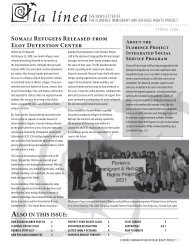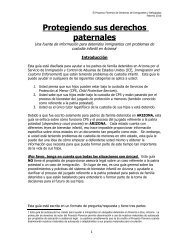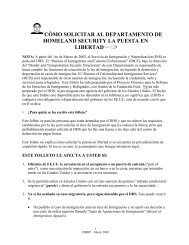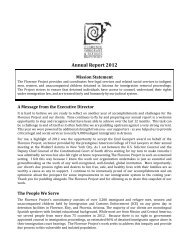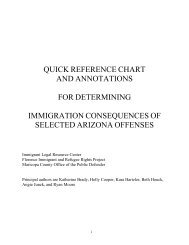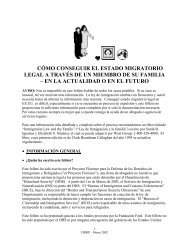HOW TO APPLY FOR ASYLUM - The Florence Project
HOW TO APPLY FOR ASYLUM - The Florence Project
HOW TO APPLY FOR ASYLUM - The Florence Project
Create successful ePaper yourself
Turn your PDF publications into a flip-book with our unique Google optimized e-Paper software.
your husband, wife, child, or parent)<br />
• fraud or income tax evasion, if the victim lost over $10,000<br />
• failure to appear if you were convicted of (1) missing a court date on a felony charge for which you<br />
could have been sentenced to at least 2 years (even if you were not sentenced to 2 years) or (2) not<br />
showing up to serve a sentence for a crime for which you could have been sentenced to 5 years<br />
• money laundering (of over $10,000)<br />
You are also an aggravated felon if your conviction was for attempt or conspiracy to commit one of the<br />
crimes listed above.<br />
If you have been convicted of an aggravated felony and can get assistance from an immigration lawyer, ask<br />
your lawyer to review your conviction carefully. Sometimes an immigration lawyer has an argument that your<br />
conviction is not an aggravated felony. Also, in some cases, a criminal defense lawyer might be able to reopen<br />
your conviction to change the sentence or the nature of your conviction.<br />
It is difficult to reopen criminal cases once you have been convicted of a crime and only certain ways of<br />
changing your conviction in criminal court will change your conviction for immigration purposes. DHS may<br />
oppose a change to your conviction or sentence if the change is made only to avoid being removed from the<br />
United States. To find out more about this, you will need to talk to an experienced immigration lawyer.<br />
• What if I have an aggravated felony conviction but my sentence was less than 5 years<br />
In that case, you may not be eligible for asylum, but you may be eligible for withholding of removal. <strong>The</strong> judge<br />
has to decide whether your crime is “particularly serious,” and if he or she decides it is, you will not be eligible<br />
for withholding of removal. We explain soon what facts the judge uses to make this decision, but it is important<br />
to understand that, most of the time, an aggravated felony is considered a “particularly serious crime.” Only if<br />
you can show that there is something special about your crime that makes it less serious will the judge consider<br />
you for withholding of removal.<br />
• If I have a crime that is not an aggravated felony, can I receive asylum or withholding of removal<br />
Maybe, but not if the judge decides that your crime is a “particularly serious crime.” <strong>The</strong>re is no list to look at<br />
and see whether your crime is “particularly serious” or not. Each case is different, and the judge will consider 4<br />
things in order to decide whether your crime was particularly serious. <strong>The</strong>se 4 things are:<br />
1) the nature of the crime (what type of crime it was and what happened);<br />
2) the sentence you received (whether it was a heavy or light sentence);<br />
3) whether it was a crime against a person or a crime against property; and<br />
4) whether the circumstances of the crime make you a danger to society.<br />
If you used a weapon, if you received a long sentence, or if you hurt someone or put someone in danger when<br />
you committed the crime, it is more likely that the judge will decide you committed a particularly serious<br />
crime and you will not be eligible for either asylum or withholding of removal.<br />
Page 13 of 49<br />
FIRRP- last update June 2007




